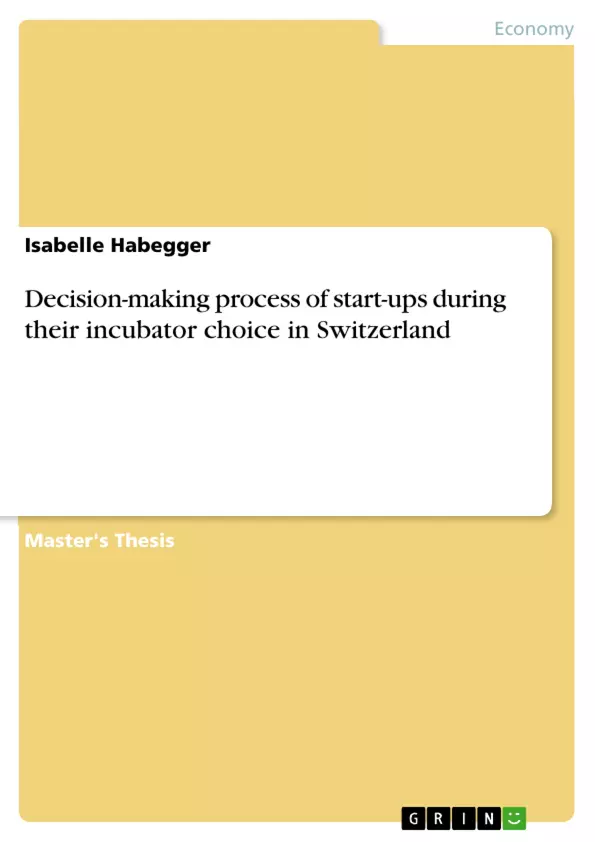This following report investigates the decision-making process of Swiss start-ups during their selection of an incubator in Zurich. It explores the ways start-ups decide on an incubator, which allows introducing a model for this matter. Thus, this study is motivated by the following research question: ‘What is the decision-making process of start-ups when selecting an incubator in Switzerland’? Previous literature failed to address the combination of incubation, start-ups and decision-making. Existing literature has focused predominantly on incubators’ performance, success factors of start-ups and decision-making reasons for creating a new venture. In other words, the gap in the literature is that primary research regarding incubator selection by start-ups has not been conducted. Hence, the aim of this research is to fill this gap by identifying the trigger for a start-up’s incubator search, the information channels it uses and the criteria for decision-making, which makes it possible to develop a framework for future start-ups, and existing as well as future incubators. The outcomes were based on semi-structured interviews with 10 start-ups in Zurich. Results showed that the trigger for incubator search is office space. Furthermore, the decision-making distinguishes itself between experienced and inexperienced entrepreneurs. Experienced mostly use search engines such as Google whereas inexperienced entrepreneurs obtain information through their close social circles. Criteria for decision-making for experienced entrepreneurs are tangible services such as infrastructure and location whereas for inexperienced entrepreneurs intangible services such as networking and coaching are valuable. The findings allow introducing a model that is useful for both existing and future incubators with suggestions to service offerings and future start-ups, providing suggestions about the decision-making process.
Inhaltsverzeichnis (Table of Contents)
- INTRODUCTION
- RESEARCH AIM
- STRUCTURE
- SCOPE
- BENEFITS TO MANAGEMENT
- LITERATURE REVIEW
- INTRODUCTION
- INCUBATION
- INCUBATION IN SWITZERLAND
- INCUBATION IN ZURICH
- START-UPS
- START-UPS IN SWITZERLAND
- CONCLUSION
- DECISION-MAKING
- INTRODUCTION
- JUDGMENTS
- DECISIONS
- Normative theory
- Descriptive theory
- Neoclassical theory
- DECISION-MAKING PROCESS
- DECISION-MAKING IN ORGANISATIONS
- DECISION-MAKING BY ENTREPRENEURS
- RESEARCH GAP
- RESEARCH METHODOLOGY
- INTRODUCTION
- RESEARCH PURPOSE
- RESEARCH PHILOSOPHY
- RESEARCH APPROACH
- RESEARCH STRATEGY
- CHOICES
- TIME HORIZONS
- DATA COLLECTION
- Construction of research sample
- DATA ANALYSIS
- LIMITATIONS
- CONCLUSION
- RESULTS AND ANALYSIS OF DATA COLLECTION
- INTRODUCTION
- OVERVIEW OF RESULTS
- PRESENTATION OF RESULTS
- KNOWLEDGE ABOUT INCUBATORS
- FEELING ABOUT INCUBATORS
- TIME OF ACTION
- TRIGGER FOR ACTION
- INFORMATION CHANNELS
- SELECTION PROCESS
- CRITERIA OF CHOICE
- TIME HORIZON OF APPLICATION PROCESS
- SATISFACTION WITH CHOSEN INCUBATOR
- USE OF COACHING
- INCUBATION IMPROVEMENTS
- SUGGESTIONS TO START-UPS
- CONCLUSION
- DISCUSSION
- INTRODUCTION
- IMPLICATIONS FOR LITERATURE REVIEW
- SUCCESS CRITERIA OF INCUBATORS
- NEEDS OF START-UPS
- DECISION-MAKING
- Organisational decision-making
Zielsetzung und Themenschwerpunkte (Objectives and Key Themes)
This thesis explores the decision-making process of Swiss start-ups when selecting an incubator in Zurich. The study aims to identify the triggers that initiate a start-up's search for an incubator, the information channels used during this search, and the criteria used for making a decision. The findings will contribute to a framework for both existing and future incubators and start-ups, providing insights into service offerings and decision-making processes.
- Decision-making process of Swiss start-ups when selecting an incubator.
- Triggers that initiate a start-up's search for an incubator.
- Information channels used during the search for an incubator.
- Criteria for decision-making when selecting an incubator.
- A framework for existing and future incubators and start-ups.
Zusammenfassung der Kapitel (Chapter Summaries)
The thesis begins with an introduction, outlining the research aim, structure, scope, and benefits for management. Chapter 2 provides a comprehensive literature review on incubation, start-ups, and decision-making, identifying key concepts and trends in these areas. The chapter concludes with a discussion of the research gap that this study addresses.
Chapter 3 delves into the research methodology, outlining the research purpose, philosophy, approach, strategy, choices, time horizons, data collection methods, and data analysis techniques. The chapter also discusses limitations inherent to the study.
Chapter 4 presents the results and analysis of data collected from semi-structured interviews with 10 start-ups in Zurich. The chapter analyzes the findings regarding knowledge about incubators, feelings towards incubators, time of action, triggers for action, information channels, selection process, criteria of choice, time horizon of the application process, satisfaction with the chosen incubator, use of coaching, and suggestions for improvements to the incubation process.
Schlüsselwörter (Keywords)
The primary keywords and focus topics of this thesis include decision-making, start-ups, incubator selection, Swiss start-up ecosystem, infrastructure, networking, coaching, intangible services, tangible services, information channels, research gap, and framework development.
What triggers a start-up's search for an incubator?
According to the research in Zurich, the primary trigger for start-ups looking for an incubator is the need for office space and infrastructure.
How do experienced vs. inexperienced entrepreneurs differ in their search?
Experienced entrepreneurs tend to use search engines like Google, while inexperienced ones rely more on their close social circles for information and recommendations.
What are the main criteria for selecting an incubator?
Experienced founders prioritize tangible services (infrastructure, location), whereas inexperienced founders value intangible services like networking and coaching more highly.
How was the data for this Swiss study collected?
The findings are based on semi-structured interviews with 10 different start-ups located in Zurich, Switzerland.
What is the benefit of this research for incubator managers?
The study provides a model that helps incubators tailor their service offerings to the specific needs and decision-making processes of different types of entrepreneurs.



